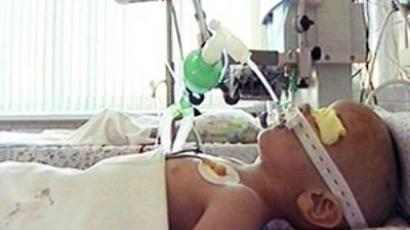Tuberculosis increase a concern, but strides in treatment being made
Tuberculosis claims about 25,000 lives each year in Russia, and doctors fear that figure could rise. It used to affect mainly the old and poor, but now it's spreading high and low.
The economic crisis has hit not only people’s wallets, but also their health.
The World Health Organization says that more than 150,000 new cases of TB are diagnosed in Russia each year, and in the past decade over a quarter of a million have died from the disease.
With a large percentage of drug resistant strains of TB, and with HIV rates rising, TB has become more complicated to treat. And it is not just the elderly and the poor who are vulnerable to the disease. More and more people considered as low-risk are being diagnosed with the disease as well.
A Chechen war veteran was found unconscious at a train station. His lungs riddled with the infectious disease, he was at death’s door. Thanks to the treatment, he is now able to walk.
“When I saw Osipov for the first time, I thought he was about 90 years old. His lungs were X-rayed, and he was immediately transferred here,” says Galiya Rakhimkulova, TB specialist at a clinic in Moscow where the veteran is being treated.
Another TB-diagnosed patient in the clinic, Viktor, believes he caught the disease from a colleague. He’s no longer able to work. Viktor says he was living a very active and full life up until he turned 20, when he was tested positive. Now doctors are trying to repair his remaining lung. But Viktor doesn’t give up.
“There definitely will be certain limitations further in life. But life is life. As it always has been,” says Viktor.
Since 1990, the TB rate in the country has grown 2.5 times over 10 years, but the situation has stabilized, says Georgy Kasatkin, the head doctor of the clinic.
“I guess TB is a kind of social barometer, and the crisis situation when salaries and jobs are cut will of course affect the case rate,” says Kasatkin.
So what are the officials claiming to be the cause behind the TB infection increase? Governmental ministers are saying the financial and emotional toll of the economic crisis are affecting the health of the nation, and medics are blaming delays and decreases in the supplies of drugs to patients. However, the World Health Organization is saying too little is being done too late in diagnosing TB patients. But the clinic’s laboratory is addressing that urgent need.
The clinic is at the forefront of TB research. The biochip, a Russian invention, speeds up diagnosis and pinpoints exactly what strain of TB a patient might have. What previously took up to a month, now takes less than five days. Prevention is better than cure – and in this research institute, they‘re working on that too.
Health care professionals balk at the idea that they have an epidemic on their hands. The statistics, they admit, are worrisome, and their job is getting harder as huge volumes of cases come in, but they hope soon to report a decline in those contracting this lethal ‘social disease’.














